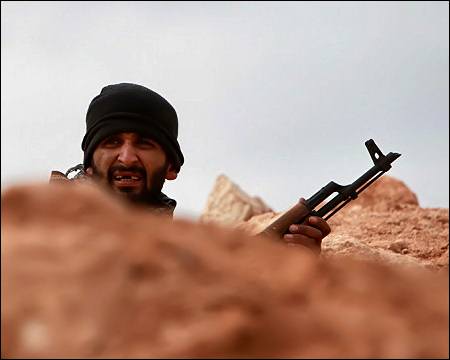The country has a long history of exporting extremists. Libyans fought in Afghanistan against Soviet forces in the 1980s, with several veterans taking up key roles in al Qaeda in the 1990s. But at home front militants did not excel in past
By : Manish Rai
The Libya connection in the Manchester concert suicide bombing and attack on Christians by extremist operating from Libya in Egypt has thrown a light on the threat posed by Jihadists groups that have taken advantage of lawlessness in the troubled North African nation to put down roots, recruit fighters and export militants to cause death and carnage elsewhere. Libya has been embroiled in violence since a 2011 uprising which toppled and killed long-time dictator Col Muammar Gaddafi.
Libya a country of about 6.4 million people, is mainly a tribal society with a weak central control. The country has a long history of exporting extremists. Libyans fought in Afghanistan against Soviet forces in the 1980s, with several veterans taking up key roles in al Qaeda in the 1990s. But at home front militants did not excel in past. Now because of chaos in the country Libya has become a “hotbed” of extremist activism.
Experts, however, say the situation is more complicated and warn against exaggerating the strength of militant groups there. The oil-rich country once had one of the highest standards of living in Africa, with free healthcare and free education, but six years on from the uprising, it is facing a deep financial crisis. With youth unemployment approaching 40%, there can be little surprise that many of its estimated 250,000-350,000 armed men have fallen in with radical groups.
ISIS has been forced out of the urban centres on the Mediterranean coast it once controlled though it still has a presence in Tripoli and elsewhere, it has scattered itself into shifting desert camps. Reportedly IS has absorbed other armed groups, most notably elements of Ansar al-Sharia, a militant group that was part of the loose alliance of rebels that rose against Gaddafi. Moreover al Qaeda also uses the remote south of Libya as a rear base for planning and logistics.
Militants operate throughout the country particularly in the country’s remote south and in the east. They poses the ability to carry out hit-and-run operations in across Libya, most probably through a network of cells, including in the capital Tripoli. Notably ISIS badly needs Libya for its operations in North Africa, to spread its paramilitary brigades, to organise its terrorist networks and, most importantly, to prepare its political pawns, after the chaos, to take over power.
For ISIS, Libya provides an opportunity not only to extend the caliphate, but to do so far away from coalition airstrikes in Syria and Iraq. Militant also looks Libya as an alternative base in case of loss of strongholds in Syria and Iraq. Before jumping to any possible solutions first we have to know the factors which helped extremist groups to strengthen themselves.
The weakness of the central authorities which fractured into two rival governments in 2014 before being joined by a third UN-backed government in 2016 led directly to the breakdown of the rule of law, security vacuums, corruption, economic stagnation have all contributed in the rise of extremists. In addition to this porous borders, no working unified security force, an abundance of loose weapons, and various things especially oil and humans that can be smuggled to finance terrorist missions provided idle atmosphere for terrorists to operate.
The time to save Libya is now. Failure to do so will have dire and tragic consequences for Libya and its neighbours. The United States should increase the number of airstrikes in Libya targeting militants and work closely with the Libyan forces currently fighting against terrorist like Libyan National Army under command of General Khalifa Haftar. United States and allies must maintain pressure on the ISIS Libya network and concurrently support Libya’s efforts to re-establish legitimate and unified government.
Stabilising Libya would undoubtedly help to fight extremism in West Africa cut the lifeline of the lethal Boko Haram, active in the whole of West Africa, and impede al Qaeda, which is threatening the Sahel countries of Burkina Faso, Mali and Niger. International community and the neighbouring countries has to facilitate formation of unified central government in the country which will act as the foundation of any counter terror efforts. Unified Central government should disarm all paramilitary groups by persuasion, incentive or sheer force and make, by law, bearing arms strictly illegal.
Offer the numerous militias the possibility to integrate the army and police force and be under the rule of law. International economic institutions will need to help Libya restructure its economy as well. Especially now that the price of oil has fallen steeply Libya is and has always being an oil-producing country where economy revolves around export of oil. Libya has the wealth, educated populace and strategic location to succeed.
Libya is truly the linchpin to any comprehensive strategy to bring stability to the region hence every stake holder in the region should contribute in stabilising the war torn nation.
‘Courtesy Asia Times’.


